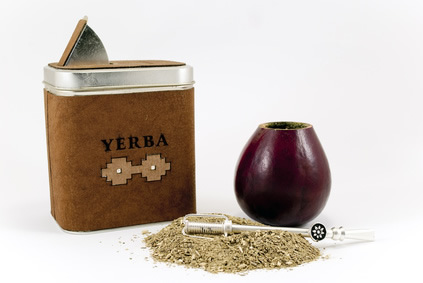Yerba mate ((Ilex paraguariensis) tea is a traditional drink in South America made from the leaves of the South American rainforest holly tree. Yerba mate contains caffeine, theophylline, and theobromine, well known stimulants also found in tea, chocolate and coffee. This stimulating herbal beverage has the unique ability to wake up the mind without the nervousness and jitters associated with coffee. Of the 196 volatile chemical compounds found in Yerba Mate, 144 are also found in green tea. Yerba Mate tea is steeped in hot water instead of boiling water, like other teas. This prevents the tea from becoming bitter.
Yerba Mate Benefits
Mate boosts energy, fights fatigue, is rich in antioxidants and minerals, reduces appetite, balances the body in all its functions and contains less caffeine than coffee or even green tea. (Among the polyphenols in Yerba Mate are caffeine, caffeic acid, quercetin, catechin, epicatechin gallate). Mate is known to contain saponins which have been shown to stimulate the immune system. The immune system, a critical collection of biological structures and processes, is important to keep as strong as possible.
 Supportive evidence provided recently by scientists proves that mate tea has a positive effect on controlling weight and boosting weight loss. In Germany, it is a popular weight-loss aid and in France Yerba Mate is approved for the treatment of fatigue and as an aid in weight loss programs. A study done at The University of Lausanne found that people who use yerba mate actually burn more body fat as energy, therefore, significantly reducing their total weight. A study done in 1999 in Switzerland, found that yerba mate had a thermogenic effect, meaning that it seemed to increase the amount of body fat burned as energy.
Supportive evidence provided recently by scientists proves that mate tea has a positive effect on controlling weight and boosting weight loss. In Germany, it is a popular weight-loss aid and in France Yerba Mate is approved for the treatment of fatigue and as an aid in weight loss programs. A study done at The University of Lausanne found that people who use yerba mate actually burn more body fat as energy, therefore, significantly reducing their total weight. A study done in 1999 in Switzerland, found that yerba mate had a thermogenic effect, meaning that it seemed to increase the amount of body fat burned as energy.
Yerba mate is full of antioxidants, including vitamin C and various flavinoids. Studies found that yerba mate contain 196 active constituents which are more than the compounds in green tea. A study published in 2008 found that yerba mate helped neutralize free radicals and protect mice from DNA damage, a hallmark of cancer and other diseases.
Yerba mate contains caffeine and stimulates the central nervous system. It is considered a stimulant, but unlike caffeine it affects the central nervous system without the addictive or nervousness caffeine can often cause. Another one of yerba mate benefits is its ability to reduce fatigue and increase mental and physical fatigue. Yerba mate is the subject of a German monograph which lists its approved uses for mental and physical fatigue.
Mate has been shown to improve digestion and repair damaged gastrointestinal tissues. Yerba mate also acts on the digestive tube by activating peristaltic movements, it facilitates digestion. Yerba mate is a traditional treatment for gastrointestinal disorders in South America.
Yerba mate also helps prevent arteriosclerosis and prevents blood clots that may cause heart attack or stroke. A study by the Federal University of Santa Catarina, Brazil found that mate could reduce the progression of atherosclerosis in rabbits. Research from the Paris Instituteindicates LDL oxidation is inhibited by extracts of Yerba Mate and incidence of arteriosclerosis is low in countries where Yerba Mate is consumed.
Yerba Mate Side Effects
A large consumption of yerba mate tea could lead to insomnia, especially if it is consumed regularly on a daily basis. When yerba mate is consumed in large doses, it has been found to have adverse affects on the liver. Show alternative translations. Caffeine can contribute to muscle tension when consumed in excess, especially for those who are prone to it. Some studies suggest that it is the very hot temperature at which yerba mate is typically consumed that increases esophageal cancer risk, rather than yerba mate itself.
Leave a Reply